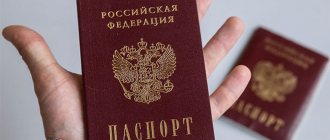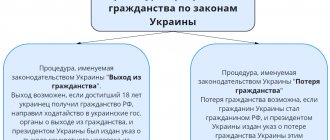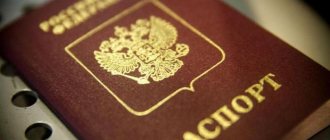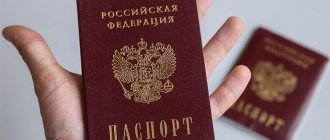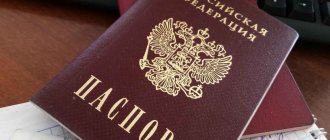There are a huge number of Russian people living all over the world who have citizenship of other countries. They received it both of their own free will and out of necessity, having left Russia or the USSR in different years. And many of them (most often of retirement age) dream of not only returning to their homeland, but also receiving a Russian passport. A program for native Russian speakers was created specifically for this purpose.
The circle of persons who are recognized as native speakers of the Russian language (NRY)
A native speaker of the Russian language or NRN is a special status that allows a foreign stateless person to obtain a residence permit, and then receive a Russian passport without unnecessary bureaucratic delays, in the shortest possible time. This provision is established at the federal level by the Law “On Citizenship”.
Usually, citizens of those states with which Russia has developed close good-neighborly relations are concerned about obtaining such status. Most often, Armenians, Moldovans, Ukrainians, Kazakhs, and Belarusians want to receive NRNs. Residents of these countries, as a rule, know truly Russian traditions, history and language of our country.
Russian law establishes a list of persons who can be considered an NRN. These are stateless persons of foreign countries, stateless persons who have reached the age of majority. The main requirements for these categories are excellent knowledge of the Russian language, a residence permit or a Russian relative living or who has lived in the Russian Federation. But all these facts require mandatory documentary confirmation.
The terms of participation
The law clearly defines the circle of persons who can take advantage of the offers available under the NRN program.
According to a simplified scheme, citizens of another state or persons who do not have citizenship can obtain a passport.
Those persons who meet the following requirements have the opportunity to obtain a passport::
- The applicant can take care of himself, he is capable. He must also be an adult.
- He speaks Russian and can use it in everyday life and during family conversations. Can speak while discussing all sorts of topics.
There is one more important condition. The point is that the applicant must not only know the state language, but also live in Russia at the moment. Or he must have lived on its territory in the past.
But these are not all persons who can apply for a passport under this scheme. Those who previously lived in the USSR can also obtain NRN status.
Important! To obtain status, it is necessary not only to have excellent knowledge of Russian, but also to confirm the fact of residence in the country, or the presence of relatives who meet the above requirements.
Interestingly, residence in the Russian Empire is also subject to accounting. This option can be used if it is possible to confirm the fact of residence in the above territories, limited by the modern territory of Russia.
In addition, the program may be of interest to those individuals who do not meet the above requirements, but whose relatives do. Of course, in this case we are talking about ancestors in a direct ascending line. Such relatives include mother or father, grandfather or grandmother, great-grandfather or great-grandmother, etc.
If the applicant does not meet these conditions, then he cannot take part in the NRL program , even with excellent knowledge of the Russian language.
Don't have the opportunity to become a participant in this program? Dont be upset. Especially for you, we have prepared other articles on ways to obtain Russian citizenship:
- by marriage;
- by parents;
- under the program of resettlement of compatriots;
- in a simplified and general manner.
Conditions for recognizing a foreign citizen as a native speaker of the Russian language
The social state program “Native Speaker of the Russian Language” was created for Russian-speaking people who are citizens of other states, but who want to obtain a Russian passport.
Even having a diploma of studying at a Russian school or university is not a guarantee for obtaining Russian citizenship on this basis. It is necessary to have relatives officially registered in the Russian Federation and to confirm both the fact of close relationship and the fact that the family member is a Russian citizen.
Only after this a person is allowed to take part in an interview to test his knowledge of the Russian language. In addition to documentary evidence, the law also imposes other requirements on applicants. A person must recognize the emotional orientation of speech and determine the style of the text.
Reasons for receiving
Foreigners are recognized as native speakers:
- Fluent in the state language of the Russian Federation at both the everyday and general cultural levels;
- Everyday people who use the language to communicate and perceive information from Russian-language sources (literature, media, etc.);
- Permanently living (or previously living) in the Russian Federation legally and/or having direct relatives (parents, adoptive parents, grandparents, etc.) living or previously living in the territories of the USSR, the Russian Empire or the Russian Federation;
- Those who have renounced their actual citizenship (except for cases provided for by international treaties of the Russian Federation).
Procedure for obtaining NRN status
Registration of NRN status allows you to obtain a Russian passport much faster. It is important to follow the order of actions. Let's take a closer look at it.
Where to apply and with what documents
Before receiving the status of “native speaker of Russian”, you should bring the following package of documentation to the Main Department of Migration Affairs of the Ministry of Internal Affairs at your place of registration:
- your current passport and its scanned copy;
- certificate of migration registration;
- application with a request to receive NRN;
- any document that confirms legal presence in Russia (work patent, migrant card);
- proof of blood ties with a Russian (extracts from house books, archival data, copies of passports).
IMPORTANT! Documents about Russians who are relatives do not need to be provided if the foreign national applying for a NRJ has a residence permit. This is a very compelling independent basis for obtaining this status.
If you don’t have the necessary information on hand, you can look for it in the archives. Status must be granted unconditionally if there is a relative with a passport containing a registration mark indicating permanent registration in Russia. Then no additional documents are needed.
Application for RN status: how to fill out
There is no special application form for recognition of a foreign national as a stateless person. The Migration Service (FMS) must offer a form to fill out. You can download a sample document on the Internet, but it may differ in different departments for migrant affairs.
Filling out the form requires indicating your personal information and information about Russian relatives (grandmothers, grandfathers, sisters, brothers). You will need to provide an additional package of documentation (TRP or residence permit, archival documents, copies of passports of relatives living in Russia and being its citizens).
You must submit your application in advance so that you have at least 3 months left before your residence permit expires. If there is a working patent, the supply should be at least 2 weeks.
Exam for NRN status: where to take it, what kind of tests, passing the commission, what questions
If the applicant has all the grounds for NRN, an application is accepted from him, and a day and time is set for the Russian native speaker exam. It includes a half-hour oral conversation on narrow and ordinary social topics. The applicant must confidently answer all the commission’s questions, understanding all the subtleties and implications. There are no examples of specific questions that committee members should ask. During the exam, employees will test their command of Russian speech at a conversational level, understanding of the language and the meaning of words. Also during this testing, connections with Russian culture are clarified.
Testing includes several stages.
Among them:
- Checking the semantic understanding of the text. An applicant for an NRL certificate is given several texts to read, after which he must answer questions about their content.
- Grammar test.
- Writing texts of various styles.
Each stage is assessed using points. They are subsequently summed up, and based on these results a general assessment of knowledge of the Russian language is given. The commission for issuing the certificate for NRN includes officials, as well as teachers from higher educational institutions.
An exam is taken by a commission, the composition of which is determined by employees of the Main Directorate for Migration Affairs of the Ministry of Internal Affairs. The location of the exam is determined individually for each applicant. This and the time of testing will be communicated personally in writing, by phone, or by email. This is done by migration service inspectors.
You should not be afraid of taking a test exam. It will take place quite freely, because the commission members do not set out to convict the applicant of ignorance of language norms. This is not a school exam, the purpose of testing is to determine that a person understands “the great and mighty” well and can express himself flawlessly on it, using national proverbs, sayings, and idioms correctly.
Sometimes they refuse to recognize a foreigner as a native speaker of Russian. They may refuse in the following cases:
- There are problems with documents. One or more are found to be false, or something is missing from the documentation package.
- Test failed. The commission recognized that the examinee constructed his speech incorrectly, did not understand the meaning of the text proposed to him, and made too many grammatical errors. That is, based on the results of all 3 blocks, he scored an insufficient number of points.
The reason for the refusal is recorded in a special protocol, and the foreign patent is given an extract from it.
You can appeal the commission's decision by filing an appropriate application in court, especially if violations were recorded on the part of the examination commission (for example, the 30-minute period allotted for testing was exceeded). Or wait until a year has passed and retake the exam.
It is also possible to schedule a linguistic examination; in this case, philologists are invited to review the examination materials.
Obtaining a certificate of native speaker of the Russian language: procedure and terms of issue
If everything goes well, the examiner is satisfied with the language level of the foreign student and his knowledge of the socio-cultural foundations of Russian society, then he will be given the appropriate confirmation of his status as a native speaker of the Russian language. Usually the commission makes its verdict immediately after testing. Within 5 days you can receive a NRN certificate.
IMPORTANT! Citizens should know that obtaining a certificate and the testing itself are procedures that are carried out free of charge; no state fee is charged for them.
Ticket difficulty level
The degree of difficulty of the questions developed as part of the comprehensive citizenship examination largely depends on the level of preparation of the examinee.
To a large extent, tests for obtaining citizenship are based on the school curriculum, and testing samples contain questions regarding the most significant dates in the history of Ancient Rus', Russia of the 18th - 19th centuries, and the USSR. There is also a block of questions regarding the legislation of modern Russia and tasks that allow you to identify your level of Russian proficiency.
For an educated Russian-speaking person, passing the exam to obtain Russian citizenship will not be particularly difficult. Sometimes no preparation is required at all.
If we are talking about foreigners who arrived from some post-Soviet states, where sometimes the Russian language is taught no more than twice a week and is often at a very deplorable level, passing this exam can become a very serious test (about the peculiarities of obtaining Russian citizenship by foreigners , can be found here). However, with a competent approach to preparation and high-quality study of the material, you can easily successfully pass all three modules.
In addition, a very big help when passing is to set a minimum response threshold in the following sizes:
- in Russian – 60%;
- in history and fundamentals of the constitution - 50%.
Reference. You should know that to obtain a temporary residence permit or temporary residence permit, basic language proficiency is required. Obtaining citizenship requires a deeper level of knowledge, which is accordingly reflected in the degree of complexity of exam questions.
Obtaining NRN status by citizens of Ukraine and CIS countries
The main applicants for NRN are residents of the countries of the former USSR. Step-by-step instructions for acquiring this status include several stages. First, you need to come to the Russian Federation legally. Then you need to contact the Main Department of Migration Affairs of the Ministry of Internal Affairs with all the documentation that will confirm your right to receive NRN:
- identity document certified by a notary;
- application with a request to receive NRN;
- card with information about migration registration;
- documentation confirming the legality of stay in the Russian Federation;
- proof of the presence of relatives - Russian citizens.
After submitting documentation within 2 days, a foreign citizen has the opportunity to take the exam. The interview takes place 5 days after his appointment. And during the next five-day period, the commission must make a decision and either issue a certificate awarding the citizen the status of an NRN, or refuse this, indicating good reasons. If the commission is not satisfied with the test result, it will have to wait a year and then try again.
Design sequence
The procedure for recognizing a person as a native speaker of the Russian language consists of a number of steps.
Stage No. 1
Is as follows:
- The applicant must live or stay in Russia legally. If he does not have a residence permit and does not have a temporary residence permit, then he must first register with the migration authorities.
If necessary, the applicant must purchase a patent or submit papers to formalize a work permit. - If the above documents are available (residence permit, temporary residence permit), then the applicant must have registration at the place of residence .
Important! If the applicant does not have registration or is not registered with the migration authorities, then these are the first things that he must do before contacting the service.
Stage No. 2
An applicant for status writes an application and submits a package of documents to the commission. Having accepted the papers, the official must inform the applicant when the interview will be held.
If the person submitting the application is in the country temporarily, then it is important to pay attention to the deadlines. The application must be submitted 15 days before the expiration date of the temporary stay. For permanent or temporary residence, papers must be submitted no later than 3 months before the expiration date.
Stage No. 3
At this stage, you need to pass an interview, which is conducted by members of the commission of the Main Directorate for Migration Affairs of the Ministry of Internal Affairs. After completing the procedure, the commission members decide whether the applicant will be recognized as a native speaker or will be given a negative answer.
Registration of a residence permit by persons with NRN status
If a person successfully passes the exam, he immediately automatically receives the right to a residence permit. It is issued for 3 years, and the citizen must submit an application for Russian citizenship within 2 years. If he does not do this, the residence permit becomes invalid.
You can apply for a residence permit at the Main Department of Migration Affairs of the Ministry of Internal Affairs by presenting the received certificate, migration card, receipt of payment of state duty, passport, medical certificates and confirmation of the application for renunciation of current citizenship. There is no need to apply for a residence permit if you already had one before taking the test.
What to do in case of refusal?
If the applicant is not recognized as a carrier, after 1 year he can re-apply for NRN status . The number of such attempts can be any.
There are other options:
- You don’t have to wait until the end of the year to apply for a temporary residence permit.
- In addition, you can try to obtain a residence permit.
- You can also become a participant in a program that is aimed at moving compatriots back to Russia.
In addition, you can challenge the commission's decision .
Advantages of persons with NRN status when obtaining Russian citizenship
A person with NRN status has the right to quickly obtain Russian citizenship. He does not need to obtain a temporary residence permit or reside under a residence permit for 5 years, as is required by law for other foreign nationals. An application for citizenship can be submitted immediately after the issuance of the NOC certificate. It is considered for a maximum of 3 months, while for other population groups the period is 6-12 months.
How long does the exam take and what testing blocks are there?
Before testing for Russian citizenship begins, the examiner will give all the necessary instructions that will allow you to understand how the test is taken. The total testing time is 3.5 hours. The whole procedure is divided into 5 stages:
- Reading.
- Letter.
- Vocabulary. Grammar.
- Listening.
- Oral exam.
Each stage of linguodidactic testing will take the following amount of time:
Simplified procedure for granting Russian citizenship to native Russian speakers
Residence permit and citizenship for native Russian speakers are provided according to a shortened scheme. An application for a residence permit will be considered for about 2 months, and for admission to Russian citizenship - 3 months. So, in less than six months you can become a full-fledged Russian patriarch, unless there are bureaucratic delays.
Where to apply for Russian citizenship
The place where the application for Russian citizenship is submitted depends on the location of the applicant himself. So, if he lives in the Russian Federation, then the document is submitted to the Main Directorate for Migration of the Ministry of Internal Affairs. When in your homeland, the request is sent to the Russian diplomatic mission.
In 2021, changes and amendments were made to the civil legislation concerning NRNs who are citizens of Ukraine and wish to officially reside in Russia. Now they do not need confirmation from their authorities that the application for renunciation of citizenship has been accepted. They need to contact the Main Directorate for Migration of the Ministry of Internal Affairs of the Russian Federation with a corresponding application. In fact, it will be an official confirmation of withdrawal from Ukrainian citizenship.
Required documents
After receiving a certificate of a native Russian speaker, a person must apply for citizenship within 2 years. Otherwise, the certificate will become invalid, and you will have to do everything again in a year. Within 2 years, you should renounce your current citizenship and then apply for a new one, having first collected the necessary documentation package:
- national passport;
- photo 3 by 4 (3 copies);
- NRN certificate;
- application requesting Russian citizenship;
- proof of legal income (work book, certificate of the owner of his own business, bank statement).
Nowadays, the procedure for submitting documents through an electronic queue is greatly simplified. No pre-registration is needed. Immediately after submitting the application, a coupon will be issued.
On May 1, 2021, V. Putin signed a decree facilitating the extradition of a number of persons. This list includes:
- citizens of Ukraine, as well as stateless persons who lived in Crimea and Sevastopol and left there before March 18, 2014 (when Crimea became part of the Russian Federation);
- Ukrainians and stateless persons living in the areas of Donetsk and Lugansk as of April 7, 2014 and April 27, 2014, respectively;
- foreigners and stateless persons whose relatives or themselves were forcibly evicted from the Crimean Autonomous Soviet Socialist Republic;
- citizens of Syria, Afghanistan, Yemen, Iraq who were born in the RSFSR and had citizenship of this republic.
The decree also applies to daughters, sons, stepdaughters, stepsons, wives, husbands, parents of all of the above categories of persons.
Certificate of Russian language proficiency
State duty and processing time
Russian legislation clearly defines the time frame for considering applications for Russian citizenship. If registration proceeds in the usual manner, then this period is 12 months. But the simplification of the procedure has reduced the waiting period for receiving a Russian passport to 6 months. Simplified citizenship of the Russian Federation for native speakers of the Russian language provides for the issuance of a passport within 3 months. The state duty in 2021 for acquiring Russian citizenship is 3,500 rubles.
Reasons for refusal: what to do
The status of a native speaker of Russian and Russian citizenship are not identical concepts. Receiving an NRN is not yet a guarantee of issuing a Russian passport. Its issuance may be refused if there are the following reasons:
- false documents were provided;
- the fact of participation in extremist or terrorist organizations has been established;
- there is an outstanding criminal record.
If the applicant does not agree with the wording of the refusal, he has the right to appeal to the courts.
Notification of citizenship
Within a month after the issuance of the order on granting citizenship, GUVM employees are required to send a notification by mail. It contains information about where, when and what time a new citizen of the Russian Federation should arrive to take the oath and present a passport.
Knowledge assessment system and retake option
In order to pass, you must score at least 66% correct answers for each block. There are times when this cannot be done. In this case, it is possible to retake a separate block, but for a fee - 50% of the cost of the test (3000 rubles, if there are no benefits).
If 2 or more blocks are not passed, then the entire exam must be retaken. In this case, you will have to pay the cost of the tests again in full (6,000 rubles if there are no benefits).
Important! You can retake it not only at the selected testing center, but also at any other (we provided the list for review at the beginning of the article, but in practice there are many more of them, because each of them enters into agreements with other centers that take exams on behalf of official centers) .
If the exam is passed, a certificate is issued within 10 days. It is this that must be provided along with other documents for Russian citizenship when submitting them to the Ministry of Internal Affairs for migration issues.
Thus, to successfully pass the Russian language exam for Russian citizenship, you will need to select a testing center, pay 6,000 rubles (if you are not eligible for a discount), sign up for testing, prepare the necessary documents, and successfully pass 5 test blocks. Those who pass the test are issued a certificate of passing the test, which must be presented to the Ministry of Internal Affairs for Migration Issues to obtain citizenship, along with other necessary documents.
Renunciation of citizenship of a foreign state when obtaining Russian citizenship
You cannot submit an application to become a citizen of the Russian Federation until you have received an exemption from the citizenship of your country. To confirm the fact of renunciation of previous citizenship, it is necessary to order a certificate from the Main Directorate for Migration Affairs of the Ministry of Internal Affairs regarding the possibility of admission to Russian citizenship before starting to obtain a residence permit. It will serve as confirmation that the person has the right to receive a Russian passport.
Such a document will definitely be required by the embassy staff, where the citizen will apply to renounce his current citizenship. The refusal is submitted personally by the applicant himself in writing.
If renunciation of citizenship is impossible for some reason, then you need to obtain a document confirming this fact. All the same, in any case, the document will have legal force, since it is it that records the citizen’s appeal to the embassy or consulate. The inability to renounce one’s current citizenship is most often due to the categorical nature of the authorities, who prohibit becoming a citizen of the Russian Federation, or the absence of such a procedure in the country’s legislation.
There is no need to renounce citizenship for residents of the LPR and DPR (Donbass territory). And also to patrides of Tajikistan, since there is an agreement between Russia and Tajikistan that allows them to have dual citizenship.
In some countries, authorities require you to pay a tax for renouncing your citizenship of your country. Thus, residents of Moldova will have to pay 330 euros, Ukraine – 13,650 rubles, Kyrgyzstan – 135 dollars, Uzbekistan – 110 dollars.
Required documents
To take the exam, a foreigner needs to contact one of the certified centers in the region where he lives in the Russian Federation. This can be done by contacting the center in person, or you can make an appointment by phone or fill out an electronic application form (if such a service is provided by the center).
After receiving approval, you need to pay the state fee, and attach the receipt to the package of documents in which you need to put:
- Statement;
- Passport and its copy;
- Migration card (+ copy);
- Translation of a passport of a citizen of another state (the document must be certified by a notary).
A law allowing citizenship to be obtained within three months
One of the most important regulations regulating and simplifying the procedure for obtaining Russian indigenous citizenship is the Federal Law of April 20. 2021 No. 1-FZ “On amendments to the Federal Law “On Citizenship of the Russian Federation” and certain legislative acts of the Russian Federation.” In accordance with it, native speakers of the Russian language will be able to obtain Russian citizenship in three months; Article 1 determines the procedure for recognizing foreigners and stateless persons as a NRY. The interview is conducted by a special commission formed by the federal executive body. The procedure for its formation, requirements for members, rules for conducting interviews, requirements for the application form and decisions of the commission are determined directly by the executive body authorized to exercise control and supervision functions in the field of migration. Also, the new law on citizenship of the Russian Federation for Russian-speaking foreigners determines the deadlines for filing an application for assignment of the status of a native speaker of the Russian language.
After the changes enter into legal force, a foreigner temporarily staying in the country cannot travel outside of Russia after the expiration of the visa (or other period), if the territorial body of the Main Migration Directorate of the Ministry of Internal Affairs has accepted an application for admission to Russian citizenship.
Taking the citizenship test online
There is no online test-taking service in 2021 because examiners technically have no way to verify that the person answering the tests is actually the person who submitted the documents.
You cannot take exams online to obtain citizenship, but you can prepare for testing online. To do this, many sites present standard tasks, by completing which a person receives a good practical basis.
Online testing increases the chances of passing the exam the first time, introduces migrants to sample questions, helps assess real possibilities, and improve certain topics.
How is testing done?
Not all educational institutions have the right to conduct such testing. Only 4 universities have the right to accept citizenship tests: Moscow State University, St. Petersburg State University, RUDN University, and IRYA. You can take the exam at a local center, but only at one that has a cooperation agreement with an educational institution from this list.
A citizen who successfully passes the exam will receive a corresponding certificate. It is issued after 10 working days. Those wishing to obtain Russian citizenship do not need to take a history test.
Testing is carried out after pre-registration by phone. After the call, the applicant receives an invoice (currently the amount for passing the exam is 6,000 rubles). You must pay for it and submit the receipt along with other documents.
The test taker will be offered a consultation, during which the organizers will talk about the structure and content of the upcoming exam. You don't have to pay for this.
Those who come for the exam are given matrix sheets. The applicant fills them out independently with a blue or black gel pen. If you have any questions, they can only be asked before the test begins.
Russian language testing is a serious procedure, so it is important to follow a number of rules. You cannot use dictionaries and other reference books, or any mobile devices. It is forbidden to talk with other test takers. You cannot leave the audience. A certain time is allotted for the exam, after which you must submit the matrices to the examiner.
The person who violates the rules will be removed from the audience and his answers will be canceled. In this case, payment will not be refunded. The fact of violation will be recorded in the protocol, which must be kept during the exam.
Specialized testing centers provide preparatory courses and individual consultations. This will help you prepare better for the exam. These services are paid. But there is a free alternative - online testing. There are a lot of resources offering similar services. You can download tests to practice on paper (some people are more used to it).
Online testing
A mobile application can also help with preparation. Special courses have been developed that will help migrants quickly master the Russian language and successfully pass the test for Russian citizenship.





